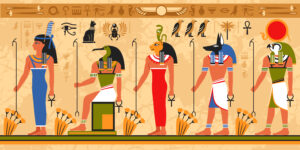Baal was a god worshiped by pagans—and sometimes by Israelites—in the Middle East. The name means “owner” and also is the word for “husband” in Hebrew. The God of Israel had a dramatic showdown with the priests of Baal on Carmel Mountain in Elijah’s day, yet despite God’s resounding victory, the appeal of Baal didn’t die.
The salutary story of Gideon, the Baal-wrestler
Why, you might ask, would the Israelites, who really should have known better, keep returning to this vile and futile idolatry? The answer I think can be found before Elijah’s time, in the story of Gideon. Known also as “Jerubbaal”, meaning “one who strives with Baal”, Gideon’s life leaves us with a salutary warning that idolatry is a constant danger to us all. Even today.
God chose Gideon, as scared as he was, to bring down Baal. The Angel of the Lord Himself appears to Gideon with the following instructions:
“Take the young bull that belongs to your father and a second bull of seven years old, pull down the altar of Baal that belongs to your father, cut down the Asherah that is beside it, build an altar to Adonai your God on the top of this stronghold in an orderly manner, and take the second bull and offer a burnt offering with the wood of the Asherah pole that you will cut down.” (Judges 6:25-26)
Afraid, Gideon obeys the instructions but in the dead of night, to avoid being seen. However, the whole village eventually figures out it was him and he earns the moniker “Jerubbaal”, the Baal-wrestler. “Let Baal contend with him”, his father sagely suggests to Gideon’s critics, knowing full well that Baal couldn’t lift a finger against his son. Gideon not only pulled down Baal’s altar but went on to lead Israel into a miraculous God-given victory against their idol-worshiping oppressors. The Midianites were soundly defeated and their god Baal was no match for the God of Israel. But the battle was not over.
Back with a bite
We learn from Scripture that man-made idols have no power in themselves, but that worshiping them is in fact the worship of demons (see Deuteronomy 32:17 and Revelation 9:20 for example).
There are demonic entities behind every idol. Even when the visible statues are burned, crushed, or destroyed, the invisible enemy lurking behind them will come back and try to solicit worship again through a different avenue.
The enemy snuck up on Gideon like a snake. After all the spoils of successive wars were amassed, Gideon and his army were rich. We sadly read that Gideon fell into idol worship of a more subtle kind.
Gideon said to them, “I would make a request of you, that you would give me every man an earring from his spoil.” (For they had golden earrings, because they were Ishmaelites.) “We’ll certainly give them!” they replied. So they spread out a robe, and each one of them threw an earring from his spoil. So the weight of the golden earrings that he requested was 1,700 shekels of gold—besides the crescent ornaments, the pendants and the purple robes that were on the kings of Midian, and besides the chains that were on their camels’ necks.
Gideon made it into an ephod, and put it in his town Ophrah. But all Israel prostituted themselves after it there, and it became a snare to Gideon and his household. (Judges 8:24-27)
While promising the people that God alone was their ruler, Gideon sent out the offering plate and repeated one of Israel’s darkest episodes. It’s strikingly similar to the golden calf episode, isn’t it? And so Gideon started to put his trust in that tangible golden ephod instead of the unseen LORD and it tripped him up all the days of his life. Gideon’s worship was misdirected and the story does not end well.
Beware the beast
If we think we are safe because we don’t have a literal statue that we’re sacrificing to, we’re badly mistaken. Anything that we have fallen into putting our trust in instead of our God is an idol. We gravitate toward the tangible, and trusting in God is not always easy. A rabbi even warned me that the Western Wall in Jerusalem can become an idol if we pay more respect to those bricks than the God whose holy temple once stood right behind it.
Baal was a god of fertility and the weather, which the ancients would depend upon for survival. When we feel out of control or under threat, the temptation to turn away from God to find solutions can be strong.
Whether it’s control or comfort we’re after, we need to seek God for the grace to turn to Him for what we need. Many are looking for safety and security in all kinds of places except God. This is idolatry. HE alone is our strength and our shield. We must put our trust first and foremost in Him. Many turn to recreational drugs and entertainment to find the peace of mind and joy we should be finding in God. Idolatry. Indeed anything that we are turning to for security and wellbeing before we turn to God is in danger of becoming an idol in our lives – even if it is not wrong in itself. Even when life is sweet we can stumble into the idolatry of fixating on the gifts we’ve received instead of the Giver. God alone is to be worshiped, not because he’s a megalomaniac, but because a right relationship with God is what we need to thrive. It’s the way we are created. Idolatry takes us down a path to destruction and inevitably becomes a snare, as Gideon found in his life-long wrestle with Baal.
Do not bow the knee to Baal
We need to be those who refuse to bow the knee to Baal – in any and every form. This might take a bit of courage, and might feel extremely scary as Elijah found. He felt like he was all on his own… but he was not. There were in fact thousands like him who had not bowed the knee. Paul the Apostle retells his amazing story in Romans, and relates it to our lives as we follow Jesus:
Do you not know what the Scripture says about Elijah, how he pleads with God against Israel? “Adonai, they have killed your prophets, they have destroyed your altars; I alone am left, and they are seeking my life.” But what is the divine response to him? “I have kept for Myself seven thousand men who have not bowed the knee to Baal.” So in the same way also at this present time there has come to be a remnant according to God’s gracious choice. But if it is by grace, it is no longer by works; otherwise grace would no longer be grace. (Romans 11:2-6)
We need God’s grace to worship Him alone. We need God’s help to turn away from idols and worship in spirit and in truth. The exciting thing about the story with Elijah is the fact that he was able to affect the entire nation by his courageous stand.
Will the real God please stand up!
Due to generations of corruption and abandonment of God’s word, Israel had fallen headlong into idolatry of the worst kind. Elijah felt very much alone in his resolution to bow only to the God of Israel – an important part of the story – but after a time of preparation, he went for the jugular. Ahab, the wicked king, called Elijah a “troubler of Israel” which was of course the exact opposite of the reality; the height of projection. Bad guys often do this – accuse others of committing the very sin they are wrapped in themselves. But Elijah threw down the gauntlet and challenged Ahab’s god Baal to a dual against the Almighty.
So Ahab sent word to all the children of Israel and gathered the prophets together at Mount Carmel. Then Elijah approached all the people and said, “How long will you waver between two opinions? If Adonai is God, follow Him; but if Baal is, follow him.” (1 Kings 18:20-21)
The contest was to see which of them could supernaturally light the fire of the altar and burn up the sacrifice. Baal, being basically impotent, lost badly. Not much of a contest really to the God who made the universe and who invented fire. You’d think this would be obvious, but no.
Then Elijah said to all the people, “Come near to me.” So all the people came closer to him. Then he repaired the damaged altar of Adonai. Elijah took twelve stones—like the number of the tribes of the sons of Jacob, to whom the word of Adonai had come saying, “Israel shall be your name”— and with the stones he built an altar in the Name of Adonai… Now it was at the time of offering up the evening sacrifice that Elijah the prophet came near and said, “Adonai, God of Abraham, Isaac and Israel, let it be known today that You are God in Israel, that I am Your servant, and that I have done all these things at Your word. Answer me, Adonai, answer me, so that these people may know that You, Adonai, are God, and that You have turned their heart back again.”
Then the fire of Adonai fell and consumed the burnt offering—and the wood, the stones and the dust—and licked up the water that was in the trench. When all the people saw it, they fell on their faces, and they said, “Adonai, He is God! Adonai, He is God!” (1 Kings 18:30-39)
See how short Elijah’s prayer is? He trusts in his God. It didn’t take loads of words or flowery language. Elijah had been getting to know God in the secret place, and his confidence in God was strong. In these critical days, God is separating out His remnant. Let us be those who worship the Lord God only, who refuse to bow the knee to Baal, and avail ourselves as vessels to reach the lost. You might feel alone but you are not.
Join the standing remnant! And God will do great miracles.
Photo by Artem Maltsev on Unsplash
















